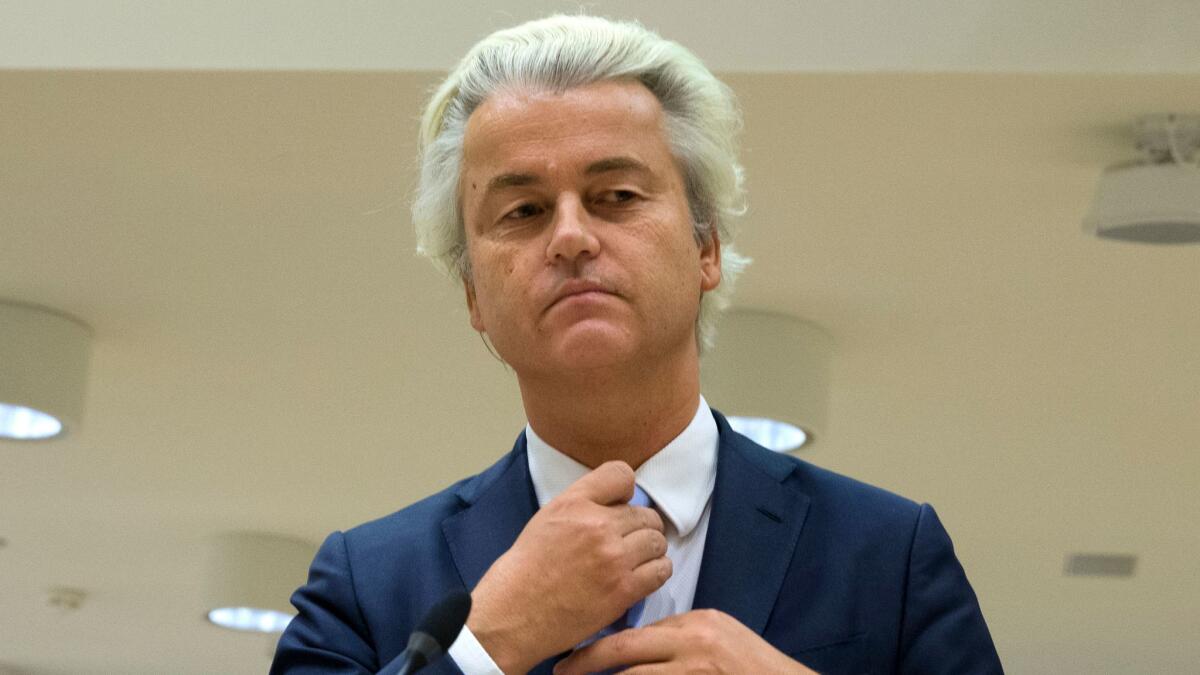Dutch court convicts far-right populist politician of inciting discrimination

- Share via
A far-right Dutch politician who has made attacks on Islam his signature issue was convicted Friday of inciting discrimination – but the court ordered no penalty, and more serious hate-speech charges were dropped.
The trial of Geert Wilders, whose Party for Freedom is leading in polls ahead of parliamentary elections set for March 2017, had been closely watched not only in the Netherlands, but elsewhere in Europe, where far-right populist parties have seen a surge of support.
Public attitudes about Islam, immigration and cultural assimilation are likely to have a strong bearing on elections next year in Germany and France, in addition to balloting in the onetime liberal stronghold of the Netherlands.
Wilders, a flamboyantly theatrical figure, was charged in connection with remarks at a March 2014 appearance during a municipal election campaign, in which he encouraged a crowd of supporters to shout demands that fewer Moroccans be allowed in the country.
When they responded with raucous chants, he smiled and promised to take steps to fulfill that aim. The scene was shown on national television.
The three-judge panel Friday declined to impose a penalty -- and dropped the more serious charge of hate speech, instead convicting Wilders of inciting discrimination and “insulting a group.”
The 53-year-old politician denounced the verdict and said he would appeal. He quickly took to Twitter to brand the court’s finding as “madness” and asserted that “half the Netherlands” shared his views.
Wilders has adopted a public stance on Islam that was long considered well outside the country’s political norms, including advocating a nationwide ban on the Koran and the closing of Islamic schools.
There has been public pushback against his most hard-line views. The trial was triggered by nearly 6,500 complaints received by police, and the court proceedings included testimonials from Dutch Moroccans who said they felt threatened and demeaned by Wilders’ comments. The prosecution had sought a fine of 5,000 euros, or about $5,280.
Prime Minister Mark Rutte, who heads a rival liberal party, demanded that Wilders renounce his remarks about Moroccans, and said he would otherwise refuse to join with him in any coalition government -- a common political arrangement in the country.
At his trial, held in a tightly secured courtroom outside Amsterdam, Wilders invoked a free-speech defense. But the presiding judge said his words had “collectively dismissed as inferior” Dutch citizens of Moroccan descent, and chided him for using his prominence to sow divisiveness.
Moroccan-born American academic and author Anouar Majid, who has written several books about Islam in the West, said far-right parties were reaping political gains from anxiety over Europe’s wave of immigration.
“This attitude – and you find echoes of it in the recent election in the United States – comes from a sense that people are losing control of their culture, their tradition and their heritage,” he said.
In countries like the Netherlands and France, he said, discrimination and a lack of economic opportunity tended to contribute to immigrant-descended communities holding themselves apart from the mainstream, he said – leading to yet more friction and animosity.
“It’s a vicious cycle,” Majid said.
Morocco was a colonial-era Dutch ally, and many Moroccan and Turkish nationals came to the country as guest workers in the 1960s and 1970s, with larger numbers arriving later under family-reunification measures. Muslims make up some 5% of the Netherlands’ population of about 17 million.
While Holland has long been known for a tolerant worldview encompassing legal prostitution and some of Europe’s least stringent drug laws, relations with the country’s Muslim community have been increasingly fraught for more than decade.
Negative attitudes were crystallized by shock over the gruesome 2004 slaying of filmmaker Theo van Gogh, a critic of Islam, by a Dutch citizen of Moroccan descent. In the same era, Somali-born activist turned Dutch parliamentarian Ayaan Ali Hirsi, who eventually left for the United States, came under sustained threat when she crusaded against female circumcision and other Muslim mores she described as barbaric.
More recently, Dutch authorities have been alarmed by the numbers of radicalized young citizens joining the ranks of Islamic State, and by the spectre of returning fighters and suspected “sleeper” cells in the country. While Holland has not suffered large-scale terror strikes such as those that have hit neighboring Belgium and France, authorities have for the past several years assessed the terror risk as high.
Authorities on Friday announced the arrest of a terror suspect in the port city of Rotterdam. Dutch news reports said police had seized an assault rifle, cash and an Islamic State flag.
ALSO
Obama orders full review of Russian hacking during the 2016 election
Dutch detain man with a rifle, ammo and image of Islamic State flag at his home
More to Read
Sign up for Essential California
The most important California stories and recommendations in your inbox every morning.
You may occasionally receive promotional content from the Los Angeles Times.










